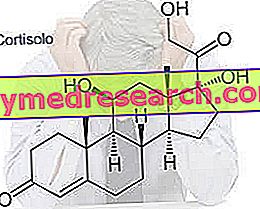Generality
Broca 's aphasia is the partial loss of spoken and written language, despite a normal understanding of it, due to a lesion of the Broca area.

The causes of Broca's aphasia include: stroke (main cause), brain trauma, dementia (eg Alzheimer's disease), brain tumors and encephalitis (brain inflammation).
In those affected, Broca's aphasia is responsible for: agrammatism, grammatical deficit, production of non-fluent and stunted speeches, difficulty in formulating complete sentences, articulating sounds or words and repeating what others have said, problems with writing and reading, and finally, a sense of frustration related to the inability to express oneself. Despite all these consequences, however, Broca's aphasia does not affect the patient's intelligence.
To formulate the diagnosis of Broca's aphasia, the following are fundamental: a doctor-patient interview, medical history, physical examination and a radiological examination, such as CT or nuclear magnetic resonance, to the brain.
Broca aphasia is a treatable condition with more or less satisfactory results, through therapies that vary from patient to patient, depending on the cause.
Review of the medical meaning of the term "Aphasia"
In medicine, the term " aphasia " indicates the loss of the ability to compose and / or understand the spoken and / or written language, due to the injury to one of those brain areas responsible for processing the aforementioned capacity.
What is Broca's aphasia?
Broca 's aphasia, or expressive aphasia, is the partial loss of the ability to compose the spoken and written language, in the presence of a normal (or almost normal) ability to understand it.
In other words, Broca's aphasia is a type of aphasia in which the patient has lost the ability to speak and write, but has not lost the ability to understand what he feels and what he reads.
Broca's aphasia is a non-fluent aphasia
Broca's aphasia is an example of non-fluent aphasia .
Unlike what happens in fluent aphasias (in which the patient presents a productive speech, affected only by some disconnected traits and very long sentences), in the non-flowing aphasias the subject involved has a very thin speech, characterized by isolated words or very sentences short and from a scarce spontaneous verbal production.
Causes
Broca's aphasia is the result of a more or less severe lesion of the Broca area, a well-defined area of the cerebral cortex having a key role in the human being's ability to know how to compose both spoken language and written language.
The Broca area locates on the lateral surface of the frontal lobe (the outermost surface of the aforesaid lobe), to be precise on the so-called inferior frontal convolution .
Active in only one of the two cerebral hemispheres (the left, in the majority of people), the area of Broca constitutes, together with the Wernicke area present on the temporal lobe, the nervous complex whose good health is fundamental to maintain the capacity intact of the human being to compose and understand the spoken language and the written language.
Causes of Broca aphasia
The main causes of Broca's aphasia are the episodes of stroke located in the area of Broca or in its immediate vicinity.
After stroke, the other possible causes of Broca's aphasia worth mentioning are:
- Brain traumas that undermine the integrity of the Broca area;

- Brain tumors that appear in or near the Broca area;
- Encephalitis, or inflammation of the brain;
- Alzheimer's disease and other forms of dementia, such as frontotemporal dementia .
HOW ICUS DAMAGES THE BROCA AREA AND GENERATES AFASIA
To understand…
In medicine, the word "stroke" indicates the interruption of blood supply to a brain area, followed by necrosis of the latter due to lack of oxygen.
A stroke at the level of the Broca area involves the lesion of the latter (triggering Broca's aphasia), because it deprives it of the oxygenated blood necessary for its proper functioning and survival. After all, every tissue in the human body, when it no longer receives the right supply of oxygenated blood, first works badly and subsequently (especially if the lack of blood supply is deep) undergoes necrosis (ie it dies).
Did you know that ...
Statistics show that 12% of cases of aphasia following stroke are Broca's aphasia.
Risk factors
Among the risk factors of Broca aphasia are:
- The factors that predispose to the stroke, that is mainly: cigarette smoke, hypertension, sedentariness, obesity, overweight, unbalanced diet, hypercholesterolemia and high triglycerides;
- The practice of sports activities in which it is quite common to be the victim of head injuries (eg: rugby, American football, etc.);
- Aging, as it is associated with a higher probability of developing dementia;
- The use of means of transport related to the risk of head injuries (eg: motorcycle, scooter, etc.).
Symptoms and Complications
If a victim of Broca's aphasia, human beings have great difficulty speaking and writing, but still understanding what others say and what they read.
This inability to be able to express, in spite of a normal or almost normal understanding, is often responsible, for patients with Broca's aphasia, for low frustration and mood.
Manifestations of Broca's Aphasia
Among the typical symptoms of Broca's aphasia, include:
- Grammatical deficit and agrammatism (loss of the ability to expose ideas through a correct syntactic ordering of speech);
- Speech not fluent and stunted. The patient with Broca's aphasia tends to omit certain words, such as articles (eg: "the", "the" etc.) and verbs (eg: "is", "has", "I want" etc.), pronouncing sentences like "I, hungry" instead of "I'm hungry";
- Difficulty formulating complete sentences;
- Difficulty in articulating sounds or words;
- Difficulty repeating what others have said;
- Problems with writing sentences;
- Reading difficulties;
- Frustration and low mood, resulting from the inability to express one's thoughts, feelings, will, etc., despite a good understanding of language and a normal faculty of reasoning.
It is important to point out that, if brain damage affects other functional areas in addition to the Broca area, the aforementioned symptomatic picture is enriched with further disorders. For example, if the brain injury also includes the Wernicke area, the patient will also have difficulty understanding the spoken and written language, following directions, etc.
Did you know that ...
The lesion of the Wernicke area (temporal lobe) is responsible for a form of fluent aphasia, known as receptive aphasia or Wernicke's aphasia, in which the patient presents a productive speech, but has great difficulty in understanding the spoken language and language written.
Does Broca's Aphasia affect intelligence?
By itself, Broca's aphasia does not affect the patient's intelligence . The area of Broca, in fact, is not related to intellectual abilities, but only controls the ability of the human being to speak and write.
Diagnosis
The diagnosis of Broca's aphasia is based on:
- A doctor-patient interview . In reality, given the consequences of Broca's aphasia, it would be more correct to speak of an attempt to talk between doctor and patient.
The inability of an individual to formulate fluent and non-disconnected speeches is the first indicator of a problem at the level of the brain area that controls language.
- History and physical examination . Given the patient's difficulty in communicating with the doctor, the support of people (relatives, friends, passers-by etc.) who know the patient's state of health and the latest events of which he was protagonist.
In addition to providing an in-depth picture of the symptomatology, medical history and physical examination allow us to establish what triggered the inability to speak (if a head injury, a stroke episode, a form of dementia, etc.); in other words, they allow us to establish the causes of Broca's aphasia;
- A CT scan or a nuclear magnetic resonance ( MRI ) to the brain . These radiological tests provide detailed images of each brain area, thus giving the possibility to accurately track and describe any lesions or degeneration of the brain.
In a context of Broca's aphasia, CT and MRI to the brain are the necessary tests for the so-called diagnostic confirmation.
Therapy
There is no standard treatment for Broca's aphasia. This condition, in fact, can improve spontaneously with time, through a language therapy ( speech therapy ) or in both the ways just indicated, depending on the triggering cause and the general state of health of the patient.
In this chapter, the article will consider the recovery from Broca's aphasia in the most common situations and will discuss the behaviors that cohabitants of a patient with Broca aphasia should adopt to be of help to the latter.
Broca's aphasia due to a stroke: recovery
When Broca's aphasia is the result of a stroke, the patient needs the support of a speech therapist, that is a doctor specialized in the treatment of speech abnormalities and articulation of the word.

The speech therapy treatment for the circumstance in question consists of a series of exercises - such as the repetition of sentences or words - aimed at restoring a certain language ability. Initially, the practice of such exercises involves several hours a day, so it requires considerable application and patience on the part of the patient.
The recovery of language capacity varies from patient to patient, depending on how severe the lesion of the Broca area is: a slightly severe lesion can be recovered with good results; on the other hand, a very deep lesion leaves very little room for improvement.
Did you know that ...
For patients with Broca's aphasia, speech therapists teach simple ways to communicate, such as very short sentences, but with clear meaning, or to draw something explanatory, in the presence of a particularly difficult request to put into words.
Broca's aphasia due to brain trauma: recovery
The recovery from Broca's aphasia due to a head injury is often spontaneous, ie it does not require a specific therapy.
In essence, therefore, when Broca's aphasia results from a brain trauma, the patient improves the ability of language without the intervention of specific medical figures, but only having the patience to wait for the natural resolution of the triggering cause. Obviously, there are special medical treatments for victims of traumatic brain injury, but these are valid in any situation, regardless of whether the brain area affected is the area of Broca.
How to help an individual with Broca's Aphasia
To be of support to an individual with Broca's aphasia, in his recovery path (thus avoiding making him feel a weight and without marginalizing him from the social context), it is very important:
- Remember that Broca's aphasia does not affect the intelligence of patients, who, therefore, are people capable of understanding exactly what they intended before losing the use of the word;
- Treat the patient as a normal person, including him in conversations (even if he says nothing or limits himself to a few words), asking him questions, involving him in daily activities, etc. This type of attitude is based on what was stated in the previous point: Broca's aphasia does not alter intellectual abilities;
- Interact with the patient with simple sentences and questions, so that the answers are not too demanding and difficult.
Involving an individual with Broca's aphasia in a complex discussion worsens the mood, as all his difficulties of expression emerge (and he is fully aware of it).
Prognosis
The prognosis in the case of Broca's aphasia depends mainly on the triggering cause: permanent lesions to the Broca area can compromise the ability to speak and write in a profound way, resulting in little recovery; on the contrary, transient alterations, but also minor injuries (as long as they are properly treated), can be resolved with good results (the recovery of spoken and written language is total or semi-total).
Other factors affecting the recovery from Broca's aphasia
After the triggering cause, the age of the patient (an elderly patient improves more slowly) and the general state of health of the patient (a patient in a precarious state of health finds more difficulty) affects the possibility of recovery from Broca's aphasia. in the therapeutic path).
How long can recovery take?
The recovery from Broca's aphasia can last days, weeks or even years ; everything depends on the severity of the lesion against the Broca area and on factors such as age, general health, attention paid to care, support from family members, etc.
Prevention
Controlling risk factors is, without a doubt, the best way to prevent Broca's aphasia (as well as all other forms of aphasia and brain damage in general). In practical terms, this means:
- Protect the head with helmets, helmets, etc., while practicing sports or work where this precaution is required and when using moving vehicles such as motorcycles, scooters, etc .;
- Lead a healthy life and adopt a healthy diet, in order to prevent stroke (which, it is worth repeating, is the main cause of Broca's aphasia).



